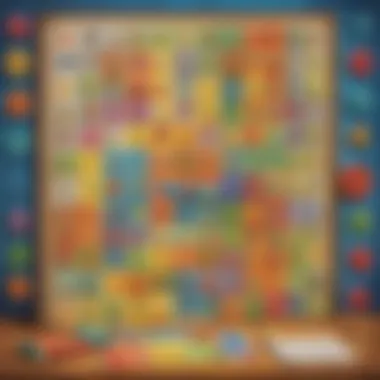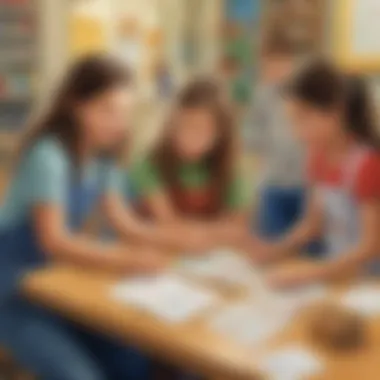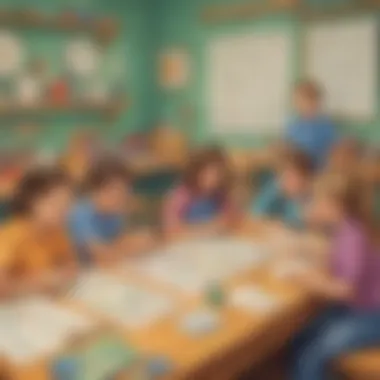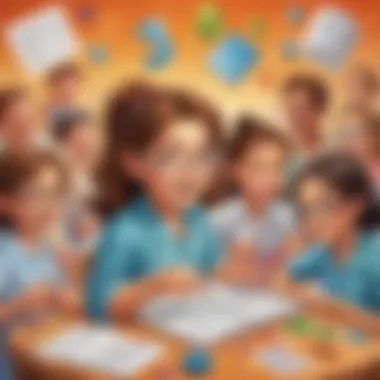Engaging Multiplication Games for Second Graders: Boost Math Skills


Fun Activities Ideas
Have you been searching for ways to make multiplication more engaging for your second-grader? Look no further! We have curated a range of exciting indoor activities that not only entertain but also educate. From interactive math board games to role-playing scenarios that incorporate multiplication concepts, your child will be immersed in a world of numerical adventures! In addition, outdoor adventures offer a hands-on approach to learning multiplication. Whether it's setting up a multiplication scavenger hunt in the backyard or using sidewalk chalk for multiplication tables, these activities make learning fun and memorable.
When it comes to arts and crafts, the possibilities are endless. Encourage your child to create multiplication-themed art projects or engage in activities where they can measure and calculate while crafting. Science experiments also provide a unique opportunity to learn multiplication in a practical manner. From measuring ingredients for a baking soda volcano to conducting seed growth experiments, your child will see the relevance of multiplication in the world around them. Cooking and baking can also be transformed into educational experiences. Whether doubling a recipe or halving ingredients, these activities reinforce multiplication skills in a delicious way!
Educational Games
Transitioning from fun activities to educational games, math and logic games offer a structured approach to practicing multiplication. From online multiplication quizzes to physical math manipulatives, your child will have a variety of options to enhance their skills. Language and vocabulary games can also be integrated with multiplication. Word problems that require multiplication to solve or creating multiplication-themed word searches add an extra layer of challenge. STEM activities bring a hands-on element to learning multiplication, incorporating it into experiments and projects that foster critical and creative thinking. History and geography puzzles provide a multidisciplinary approach to multiplication, showing its relevance across various subjects. Interactive learning apps further supplement traditional learning methods, offering a technological twist to practicing multiplication.
Introduction
Significance of Multiplication Games
Enhancing Learning Experience
One of the primary aspects that highlight the importance of multiplication games is their ability to augment the learning experience for students. By integrating game elements into mathematical practices, educators can create a dynamic and interactive environment that captures the attention and interest of second graders. This approach not only makes learning more enjoyable but also improves information retention and comprehension, making complex multiplication concepts more accessible to young minds. The unique feature of enhancing the learning experience through games lies in its capacity to bridge the gap between theoretical knowledge and practical application, providing a hands-on learning experience that solidifies mathematical concepts in the minds of students.
Fostering Interest in Mathematics
Fostering interest in mathematics at an early age is crucial for nurturing a generation of confident and proficient problem-solvers. Multiplication games play a vital role in creating a positive attitude towards math by making it engaging and relatable for young learners. By presenting mathematical challenges in a game format, students develop a curiosity and eagerness to explore the world of numbers, enhancing their problem-solving skills and critical thinking abilities. The distinct feature of fostering interest in mathematics through games lies in its transformative impact on students' motivation and confidence, instilling a lifelong love for learning and overcoming mathematical challenges.
Target Audience
Primary School Educators
Primary school educators play a pivotal role in implementing effective learning strategies and tools for second graders. Their understanding of pedagogical methods and student psychology enables them to create a conducive learning environment that fosters academic growth and cognitive development. By incorporating multiplication games into their curriculum, educators can enhance students' understanding of mathematical concepts and improve their problem-solving skills through experiential learning. The distinct feature of primary school educators lies in their ability to personalize learning experiences, catering to the diverse needs and learning styles of students, thereby maximizing the impact of multiplication games in the classroom.
Parents of Second Graders
Parents are indispensable partners in their children's educational journey, providing crucial support and reinforcement outside the classroom. For parents of second graders, engaging with multiplication games at home can not only supplement classroom learning but also strengthen the parent-child bond through shared educational experiences. By participating in math games with their children, parents can instill a positive attitude towards learning and encourage a growth mindset when facing mathematical challenges. The unique feature of parents of second graders lies in their role as motivators and facilitators, creating a supportive learning environment that nurtures children's mathematical proficiency and enthusiasm.
Overview of the Article
Exploring Diverse Multiplication Games
As we delve deeper into this article, our focus shifts towards exploring a myriad of multiplication games designed to enrich the mathematical skills of second graders. From traditional board games to modern digital applications, the landscape of multiplication games offers a diverse range of options to cater to various learning preferences and styles. By delving into these diverse multiplication games, we aim to provide a comprehensive overview of the educational benefits and unique features that each game brings to the table. The exploration of diverse multiplication games seeks to inspire educators, parents, and students alike to incorporate innovative and engaging teaching methods that transcend traditional rote learning, fostering a deep and lasting understanding of multiplication concepts among young learners.
Educational Benefits
In the realm of education, the significance of focusing on educational benefits cannot be understated. Specifically in the context of this article, delving into the educational benefits of multiplication games tailored for second graders is paramount. These benefits go beyond traditional teaching methods, offering a dynamic and engaging approach to enhancing a child's mathematical skills. By incorporating interactive and stimulating games, children can grasp and retain multiplication concepts more effectively, making learning enjoyable and practical.
Improving Multiplication Skills


Enhanced Retention
Enhanced retention plays a crucial role in the overall development of a child's multiplication skills, ensuring that they can recall and apply learned concepts with ease. This aspect focuses on the ability of second graders to retain multiplication facts for extended periods, solidifying their mathematical foundation. Enhanced retention in multiplication games not only reinforces their memory but also boosts confidence and fluency in solving mathematical problems. It serves as a beneficial choice for this article as it promotes a deeper understanding of multiplication, setting a strong groundwork for further mathematical learning.
Quick Calculation Abilities
Quick calculation abilities are a key component in bolstering a child's proficiency in multiplication. By honing this skill through engaging games, second graders can improve their mental math capabilities and computational speed. The emphasis on quick calculation abilities aims to enhance a child's problem-solving skills and efficiency in solving multiplication equations swiftly. This feature of multiplication games offers advantages such as improving arithmetic fluency, fostering strategic thinking, and promoting a faster grasp of mathematical concepts. Its integration in this article provides a practical and effective way to cultivate rapid calculation skills among young learners.
Boosting Problem-Solving Skills
Critical Thinking Development
The development of critical thinking skills is essential in nurturing a child's problem-solving abilities. Through strategic engagement with multiplication games, second graders can enhance their critical thinking capabilities by analyzing different scenarios, making decisions, and evaluating outcomes. Critical thinking development not only sharpens a child's logical reasoning but also encourages them to approach mathematical challenges with a systematic mindset. The unique feature of critical thinking development equips children with essential skills for real-world problem-solving, emphasizing the application of logic and reasoning in mathematical contexts.
Application of Mathematical Concepts
The application of mathematical concepts in multiplication games transforms theoretical knowledge into practical skills. By incorporating real-life scenarios and hands-on activities, second graders can deepen their understanding of multiplication and its applications. This aspect highlights the relevance of mathematical concepts in everyday situations, fostering a holistic approach to learning math. The unique feature of applying mathematical concepts in games offers advantages such as enhancing problem-solving abilities, promoting creativity, and reinforcing the practical utility of mathematical principles. Its integration in this article enriches the learning experience by connecting theoretical knowledge with tangible problem-solving skills.
Top Multiplication Games
In this section, we delve into the significance of highlighting top multiplication games tailored for second graders. These games play a pivotal role in supplementing traditional learning methods with interactive and engaging tools. By introducing such games, educators and parents can enhance children's multiplication skills in a fun and effective manner. The inclusion of top multiplication games in this article aims to provide a comprehensive guide for those seeking innovative approaches to math education, fostering a deeper understanding and enjoyment of mathematical concepts.
Game 1: Multiplication Bingo
Rules and Gameplay
Delving into the rules and gameplay of Multiplication Bingo offers an insightful perspective on this classic game's educational benefits. The structure of Bingo, adapted to a multiplication context, provides students with a dynamic way to practice their math skills. The rules encourage quick thinking and calculation as players strive to match numbers with their multiplication results. This aspect enhances adaptability and mental agility, crucial skills for mastering multiplication. While the gameplay may appear simple, its strategic nature amplifies children's problem-solving abilities in a playful setting.
Benefits for Second Graders
Examining the benefits of Multiplication Bingo for second graders reveals a range of positive outcomes. This game not only reinforces multiplication facts but also cultivates an interest in mathematical challenges. By incorporating elements of competition and chance, Multiplication Bingo instills a sense of excitement in learning, making math engaging for young learners. Additionally, the visual and interactive nature of the game enhances memory retention and promotes a deeper comprehension of multiplication concepts. Despite its straightforward design, Multiplication Bingo serves as a valuable tool for reinforcing fundamental skills while fostering a love for numbers among second graders.
Game 2: Math Fact Baseball
Interactive Gameplay
The interactive gameplay featured in Math Fact Baseball offers a hands-on approach to mastering multiplication tables. By simulating a baseball game with math exercises, students engage in active learning that transcends traditional memorization techniques. The immersive nature of the gameplay not only captures children's attention but also encourages participation and concentration. Through this interactive setting, students develop a practical understanding of multiplication while honing their problem-solving skills in a collaborative environment.
Practicing Multiplication Tables
The focus on practicing multiplication tables in Math Fact Baseball underscores the game's educational value for second graders. This interactive format allows children to apply theoretical concepts in a practical context, reinforcing their comprehension and recall abilities. The repetitive nature of practicing multiplication tables instills confidence and fluency in mathematical calculations, essential skills for academic success. Moreover, the progression of difficulty within the game ensures continuous challenges, enabling students to expand their multiplication proficiency systematically.
Game 3: Number War


Competitive Learning Environment
Number War introduces a competitive element to multiplication practice, fostering a stimulating learning atmosphere for second graders. By engaging in friendly competition, children not only sharpen their arithmetic skills but also develop resilience and sportsmanship. The competitive learning environment promotes strategic thinking and quick decision-making, essential skills beyond the realm of mathematics. Through Number War, students are encouraged to push their boundaries and strive for improvement, creating a dynamic space for growth and development.
Enhancing Number Recognition
The focus on enhancing number recognition within Number War underscores its role in reinforcing fundamental math concepts. By incorporating numbers in a play-driven context, children develop a visual and intuitive understanding of numerical relationships. The emphasis on number recognition cultivates a strong foundation for advanced mathematical concepts, paving the way for future learning success. Additionally, the interactive nature of the game ensures that children actively engage with mathematical content, promoting a holistic approach to numerical fluency.
DIY Multiplication Activities
In the realm of second-grade education, DIY multiplication activities hold a significant role in cultivating a hands-on and immersive learning experience for young learners. These activities are carefully curated to not only reinforce multiplication skills but also to spark creativity and critical thinking abilities among children. By engaging in hands-on projects, students can delve deeper into mathematical concepts in a personalized and interactive manner, allowing for a more profound understanding of multiplication principles. Unlike traditional rote learning, these activities offer a dynamic approach that caters to diverse learning needs and preferences, making mathematical education more enjoyable and effective.
Activity 1: Multiplication Card Match
Step-by-Step Instructions:
The Step-by-Step Instructions for the Multiplication Card Match activity serve as detailed guidelines for setting up and playing the game. By breaking down the gameplay into sequential steps, these instructions ensure clarity and ease of execution for both children and facilitators. The step-by-step format simplifies the learning process, enabling students to follow along easily and engage actively in the activity. This structured approach not only fosters independent learning but also enhances problem-solving and organizational skills in young learners. The systematic nature of the instructions promotes a methodical understanding of multiplication concepts, contributing to a more robust foundation in mathematics.
Learning Through Visual Association:
Visual association is a key feature of the Multiplication Card Match activity, allowing students to link numerical values with visual cues. This approach harnesses the power of visual learning, which is known to facilitate better retention and comprehension in students. By pairing numbers with corresponding images or symbols, children can establish strong mental connections that aid in memory recall and concept reinforcement. The use of visual aids not only makes learning more engaging and interactive but also caters to varying learning styles, ensuring that all students can benefit from the activity. Through visual association, mathematical concepts are brought to life, fostering a deeper appreciation for the beauty and logic of numbers.
Activity 2: Times Table Hopscotch
Outdoor Learning Experience:
Times Table Hopscotch offers a unique outdoor learning experience that combines physical activity with mathematical practice. By taking the traditional hopscotch game and infusing it with multiplication challenges, this activity encourages children to be active while reinforcing their times tables. The outdoor setting provides a refreshing break from the classroom environment, allowing students to engage with math in a different context. Additionally, outdoor learning has been shown to boost cognitive function and creativity, making the assimilation of mathematical concepts more holistic and enjoyable. Through outdoor exploration, students not only sharpen their multiplication skills but also develop a deeper connection with the subject, fostering a positive attitude towards learning.
Physical Engagement in Math:
Physical engagement in math is a central aspect of the Times Table Hopscotch activity, promoting kinesthetic learning and motor skill development. By incorporating movement and coordination into multiplication practice, students can embody mathematical concepts through physical action. This kinesthetic approach reinforces learning through sensory experiences, making abstract ideas more concrete and relatable. Additionally, physical engagement enhances student motivation and concentration, as the combination of movement and mental stimulation leads to a multi-sensory learning experience. By integrating physical activity with math challenges, Times Table Hopscotch offers a dynamic and immersive way for children to explore the world of multiplication.
Innovative Technology Apps
In the realm of educational advancements, Innovative Technology Apps play a pivotal role in revolutionizing the learning experience for second graders. These apps are meticulously designed to engage young minds and enhance their mathematical proficiency through interactive and immersive interfaces. By integrating technology into education, students can access a diverse range of multiplication games that cater to varying learning styles and abilities. The incorporation of Innovative Technology Apps in this article underscores the commitment to providing cutting-edge and effective learning tools for children.
App 1: MathLand
Features and Functionality
Math Land excels in its features and functionality by offering a wide array of interactive and engaging activities that make learning multiplication an enjoyable experience for second graders. The app includes adaptive learning mechanisms that adjust to each child's pace, ensuring a personalized learning journey. Moreover, MathLand incorporates gamified elements to keep students motivated and engaged, turning math practice into an exciting adventure. The unique feature of MathLand lies in its ability to provide instant feedback and progress tracking, allowing parents and educators to monitor the child's improvement in real-time. While the app fosters a positive learning environment, some limitations may include a dependence on screen time and the need for parental guidance to ensure a balanced usage.
Interactive Learning Modules


Interactive Learning Modules within Math Land offer interactive quizzes, games, and challenges that reinforce multiplication concepts in a fun and interactive manner. These modules promote conceptual understanding by providing real-world scenarios that require application of multiplication skills. The key characteristic of Interactive Learning Modules is their ability to cater to different learning styles, including visual, auditory, and kinesthetic learners. By offering a dynamic and varied learning experience, MathLand keeps students actively engaged while deepening their mathematical comprehension. However, the challenge lies in maintaining a balance between screen time and traditional learning methods to ensure comprehensive skill development.
App 2: Multiplication Master
Progress Tracking Tools
A standout feature of Multiplication Master is its comprehensive progress tracking tools that allow parents and educators to monitor the child's performance with precision. These tools enable the tracking of specific areas of improvement and areas needing further focus, facilitating targeted intervention strategies. The key characteristic of Progress Tracking Tools is their ability to generate detailed reports and analytics that provide insights into the child's learning progress over time. This data-driven approach empowers parents and teachers to make informed decisions regarding the child's educational journey. While Progress Tracking Tools offer substantial benefits, including personalized learning pathways, they may also pose challenges in terms of data privacy and the interpretation of analytical data.
Engaging Quiz Formats
Multiplication Master sets itself apart with its engaging quiz formats that combine learning with entertainment, making math practice an enjoyable activity for second graders. These formats include interactive quizzes, timed challenges, and multi-level assessments that cater to diverse learning preferences. The key characteristic of Engaging Quiz Formats is their ability to promote a sense of achievement and mastery as students progress through different levels. By incorporating gamification elements, Multiplication Master enhances motivation and retention among students, reinforcing their multiplication skills in a stimulating manner. However, ensuring a balance between screen time and active engagement is crucial to maximize the benefits of these quiz formats.
Implementing Strategies
In this section, we delve into the crucial role of implementing strategies when it comes to enhancing the multiplication skills of second graders. Implementing strategies is the key to ensuring that learning goals are met effectively and efficiently. By carefully planning and executing strategies, parents and educators can create a conducive learning environment that fosters mathematical proficiency. Strategies play a vital role in not only reinforcing the concepts of multiplication but also in making the learning process enjoyable for young learners. They provide a roadmap for parents and teachers to guide children through their mathematical journey, ensuring steady progress and comprehension.
Parental Guidance
Setting Learning Goals
Setting learning goals is a fundamental aspect of parental guidance when it comes to improving a child's multiplication skills. It involves establishing clear and achievable objectives that help track the progress of the child's mathematical development. By setting specific learning goals, parents can motivate and challenge their second graders to excel in mathematics. The key characteristic of setting learning goals is providing a sense of direction and purpose to the learning process. It enables parents to monitor the child's advancements and identify areas that require additional support. The unique feature of setting learning goals lies in its ability to instill a sense of accomplishment and progress in the child, boosting their confidence and interest in math.
Encouraging Practice Sessions
Encouraging practice sessions is another crucial element of parental guidance aimed at enhancing a child's multiplication skills. Regular practice is essential for solidifying mathematical concepts and improving calculation speed and accuracy. The key characteristic of encouraging practice sessions is the consistent repetition of multiplication exercises to reinforce learning. It is a popular choice for this article as practice is a fundamental aspect of mastering multiplication skills. The unique feature of practice sessions is their ability to build fluency and confidence in solving mathematical problems. While the advantage of practice sessions lies in improving retention and application of multiplication concepts, a potential disadvantage may be the challenge of maintaining a child's interest and engagement over time.
Integrating Games in Classroom
Incorporating Fun Learning Methods
Integrating fun learning methods in the classroom setting is paramount to keeping second graders engaged and motivated to learn multiplication. By incorporating interactive and enjoyable activities, teachers can make the learning experience dynamic and enriching. The key characteristic of incorporating fun learning methods is the ability to transform mundane lessons into exciting adventures that promote active participation. It is a beneficial choice for this article as it ensures that children develop a positive attitude towards mathematics. The unique feature of fun learning methods is their capacity to nurture creativity and critical thinking skills in children, making the learning process stimulating and enjoyable.
Interactive Group Activities
Interactive group activities play a significant role in promoting collaborative learning and teamwork among second graders. By engaging students in group tasks that involve multiplication games, teachers can enhance social skills and peer interaction while reinforcing mathematical concepts. The key characteristic of interactive group activities is their ability to create a supportive and interactive learning environment where children learn from each other's perspectives. It is a popular choice for this article as it fosters a sense of community and cooperation among students. The unique feature of interactive group activities lies in their effectiveness in encouraging teamwork and communication skills in children. While the advantage of such activities includes promoting a sense of belonging and camaraderie, a possible disadvantage may be the need for effective management to ensure all students actively participate and contribute.
Conclusion
In the realm of multiplication games tailored for second graders, the conclusion converges on the fundamental aspect of amalgamating fun with educational efficacy. This article's culmination accentuates the pivotal role these games play in not just enhancing mathematical skills but also fostering a love for numbers and problem-solving at an early stage. By delving into the world of interactive learning, children can embrace math in an enjoyable manner while bolstering their cognitive abilities. Discussions center around the significance of making learning an engaging experience, vital for the holistic development of young minds.
Elevating Multiplication Learning
Empowering Second Graders
Empowering second graders through multiplication games is a cornerstone in the educational foundation laid by this article. By instilling a sense of accomplishment and confidence in tackling mathematical challenges, this facet aims to equip young learners with the resilience and skills needed to excel in their academic journey. The emphasis lies in nurturing independence and critical thinking skills, enabling children to approach mathematical concepts with creativity and analytical prowess. The distinguishing feature of empowering second graders is its ability to cultivate a growth mindset, essential for overcoming obstacles and embracing learning wholeheartedly within the domain of math education.
Making Math Enjoyable
Within the framework of making math enjoyable, the article endeavors to transform numerical calculations into an exciting and engaging experience for second graders. By infusing elements of play and exploration into mathematical tasks, this segment seeks to dismantle any apprehension or aversion towards numbers, paving the way for a positive learning trajectory. The inherent characteristic of making math enjoyable is its capacity to turn abstract concepts into tangible, relatable experiences, resonating with the young learners' innate curiosity and zest for discovery. With a focus on interactive and stimulating methodologies, this approach ensures that children perceive math not as a daunting subject but as a vibrant playground of possibilities, igniting a passion for numerical fluency and problem-solving prowess.



